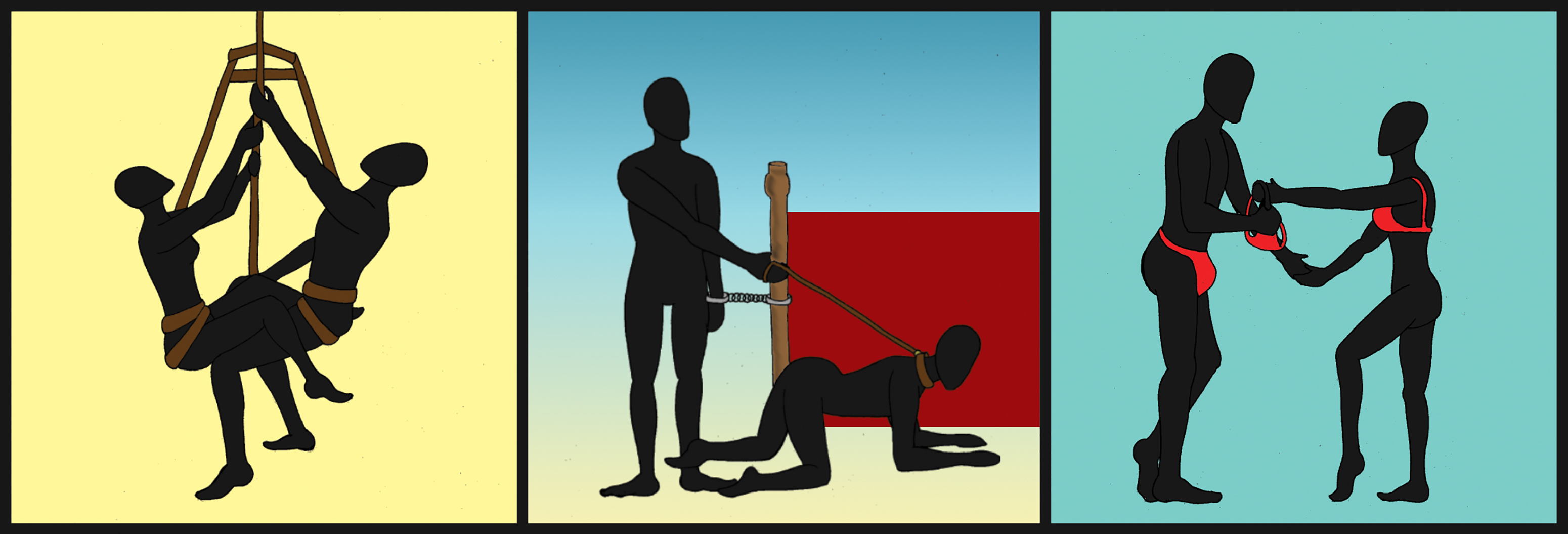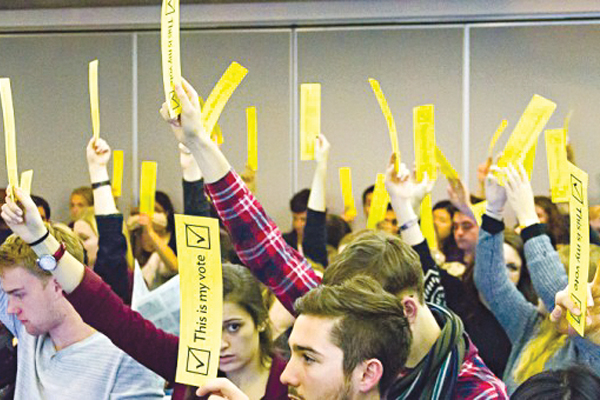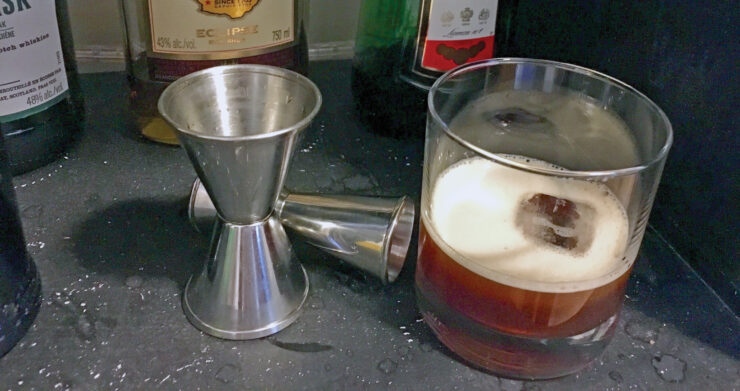The fine line between sexual exploration and perpetuating rape culture
When a little-known event called Vet’s Tour—organized by the University of Ottawa’s Science Students’ Association (SSA)—came to light last month, it ignited fierce debate among onlookers and participants alike.
In an article published by la Rotonde, a source under the alias Pascale spoke of her experience being groped without her consent during last year’s edition of the event. After the publication of that article and subsequent uproar across campus, participants of this year’s Vet’s Tour emailed the Fulcrum to express outrage about the negative rhetoric surrounding an event which they felt helped promote non-judgemental sexual exploration.
Unfortunately, both sides of the Vet’s Tour debate have failed to reach a productive end, with the university characterizing the event’s participants as acting “disgracefully.” On the other end of the spectrum, la Rotonde news editor Yasmine Mehdi has received Islamophobic remarks for writing the initial story.
But at the end of the day, this type of discourse fails to help either side.
The wide range of experiences relayed to both the Fulcrum and la Rotonde begs a more interesting point of discussion—how can events simultaneously promote non-judgemental, group-oriented sexual exploration, while ensuring a safe, anti-rape culture environment for its participants?
It’s not clear what the aim of the SSA was with the Vet’s Tour event, since they did not provide comment to the Fulcrum by the time of this publication. However, if—as participants of this year’s Vet’s Tour have advocated in their letters to the Fulcrum—it truly was about promoting sex-positivity, it’s essential to look at what steps the SSA failed to take in ensuring the safety of its participants.
Hopefully, by having an open discussion on this topic, students can take the right steps to ensure safer, healthier, and ultimately more fulfilling sex-positive relationships and events on campus.
Understanding social attitudes towards sex
The outcry across campus was largely related to the assertion that Vet’s Tour was a means of promoting rape culture. However, the validity of this term has been a topic of frequent debate on Ottawa’s campuses.
Carleton University administration remains hesitant to adopt the term in the development of their mandatory sexual assault policy, while the University of Ottawa failed to acknowledge the term altogether in its own policy, much to the dismay of the Student Federation of the University of Ottawa (SFUO).
Despite this disagreement, Dr. Peggy Kleinplatz—a professor in the Faculty of Medicine, clinical professor in the School of Psychology, and director of sex and couples therapy training—believes that in some situations we have all the ingredients for a “toxic brew” that makes it more likely for sexual assault to occur.
Kleinplatz cites Peggy Reeves Sanday’s research, saying that in determining whether a society is “rape-prone,” a term she notes is akin to the more popularly used “rape culture,” there are several key indicators.
“The combination of sexism, or gender role inequity, in a society that is sex-negative (that is, uncomfortable with sexuality) means that a couple of things could potentially emerge—namely, the inability to talk openly about sexual consent between partners,” said Kleinplatz.
“This is paradoxical in a place like North America, where public discourse around sexuality is everywhere. But because we remain privately sex-negative, we’re unable to have the kinds of conversations between partners that would enable us to engage in joint decision making comfortably.”
When this private sex-negativity occurs, it becomes comprehensible on a wider scope why it’s estimated that only 6 of every 100 incidents of sexual assault and 1–2 per cent of date rape sexual assaults are reported to the police.
This same trend prevails at the University of Ottawa, as the U of O’s Task Force on Respect and Equality reported in 2015 that as many as 44 per cent of female-identified students experienced sexual violence in the form of unwanted touching, whereas a 2015 survey from the CBC showed that only ten students had reported an assault to the university over a five-year period.
“We’re still very much heir to a Victorian legacy, which says men are more ‘naturally’ sexual, and women don’t really want it, or if they do they won’t admit to it because they’ll be seen as slutty. And so instead women will be perceived as putting up token resistance,” said Kleinplatz.
“To the extent that these ingredients mix with the belief that women need to be gently cajoled or not-so-gently coerced into engaging in sex, you have the toxic brew that’s required to make it more likely that sexual assault will occur in a given culture.”
Healthy sexual encounters: Consent is only the start
So why was Vet’s Tour considered an event that promotes rape culture, instead of healthy sexual exploration among students?
Francesco Caruso, vice-president of services and communications at the SFUO, said that the federation’s issue with Vet’s Tour was not the fact students wanted to explore their sexuality, but the excessive alcohol consumption.
“Exploring one’s sexuality is a vital and important part of growing up and learning about ourselves and our bodies. Any such exploration, however, must be done consensually for all parties involved,” said Caruso. “The issue with Vet’s Tour is that mixing alcohol with sexual exploration can lead to someone’s consent being ignored or coerced, which participants have reported happening.”
According to Blair Crew, a part-time professor in the University of Ottawa’s Faculty of Law, common law section, section 273.1, subsection 2 subsection d of the Canadian Criminal Code states that no consent can be obtained if the complainant in a case is incapable of consenting to the activity.
“The courts have repeatedly found that one of the reasons a person can become incapable of consenting to an activity is if they lack the mental capacity to consent because of consumption of alcohol or any other drugs for that matter,” said Crew. “So to that end, drunkenness can become something that overrides consent.”
Kleinplatz was in agreement with Crew, and compared the cultural norm of engaging in sex after binge drinking to drinking and driving—a dangerous practice that was not addressed by Canadian legislation until 1969. Kleinplatz thinks it might be helpful to learn from that trajectory in dealing with drinking and sex.
“It took concerted effort on the part of government, and groups like Mothers Against Drunk Driving to change the culture from one in which it was acceptable to drink and drive to one that suggests instead that we talk and plan in advance so that we have designated drivers,” said Kleinplatz.
“So this is now a question of recognizing that there’s potential danger, and being sensitized to changing our cultural norms around alcohol and sex in the same way that we changed them around alcohol and driving.”
Crew is unsure as to whether Parliament will intervene in Canada’s courts to create new legislation around drinking and sex in the near future, but he does think that awareness in the judicial system is on the rise.
“By now the courts are much more educated about the effects of alcohol, so I think there is a continuing trend to be more wary of (sexual assault) defenses where alcohol is involved,” he said.
Beyond the question of consent, Kleinplatz said that when we talk about healthy sexual exploration with others, it’s important to consider a level beyond consent: willingness.
This concept goes beyond an ordinary consideration of whether an action would count as sexual assault, and instead considers whether or not each person engaging truly feels free to say “yes” or “no,” or if they feel pressured or coerced.
Given the nature of Vet’s Tour’s sexual activities, which were in a challenge format, it’s not hard to see how the element of pressure may have been a part of some experiences at the event.
“A fairly high percentage of men and women often feel that they don’t have the freedom to say ‘no.’ They may have the right, legally, but they don’t feel they have the freedom to say ‘no,’ and that makes them less wholehearted in their willingness. And all of this contributes to the potential for unwanted sex,” said Kleinplatz.
She also noted that this silence can ultimately contribute to men and women “not feeling comfortable with their sexuality, and not feeling comfortable enough to have a conversation that gives rise to full willingness, let alone consent.”
But this is not to say the element of non-judgemental sexual exploration—a major aspect of Vet’s Tour brought forward from those who wrote letters to the Fulcrum—isn’t worth discussing.
Kleinplatz is a major advocate for equitable, pleasurable, safe, and consensual sexual activities, and said that all of these elements are indicative of a healthy sexual encounter. She thinks BDSM club organizers are exemplary when it comes to creating an atmosphere for healthy exploration, as they ban the use of drugs, alcohol, and recording devices, while advocating the credo “safe, sane, and consensual.”
Kleinplatz said “safe” requires physical and emotional safety, as well as safety from unwanted pregnancies and sexually transmitted infections, while “sane” requires free will and that people are able to give informed consent, meaning they are not inebriated or feeling pressured.
She also noted it’s essential that there’s “some discussion about what kinds of sexual acts, in what kinds of contexts, with which kinds of consequences” there will be before entering into situations where the activities will occur. This is another element of a safe, sex-positive event where Vet’s Tour fell short.
According to la Rotonde, participants in Vet’s Tour were not made aware of the list of activities prior to the event, and the event was invite-only, with no advertising or promotion of the event to give participants a clear idea of what they would be participating in.
Another point worth noting about Vet’s Tour was the lack of protection of the participants’ privacy. The Vet’s Tour story in la Rotonde featured a photo, taken by Mehdi, of participants engaging in Vet’s Tour activities in a bathroom stall. This marks a clear violation of what Kleinplatz said is an essential element of safe, sex-positive events—protection of privacy.
While there should be a place for sex-positive events at the U of O, Vet’s Tour cannot be considered an event of this genre without the elements of safety, mental competency, consent, and protection of privacy—areas in which it consistently fell short.
Getting inspired with sex-positivity on Canada’s campuses
Sex-positive events that are organized by on-campus groups aren’t exactly unheard of. In fact, the University of Toronto’s Sexual Education Centre (SEC) has actually hosted events at a sex club in the past that focus on sexuality and exploration. But unlike Vet’s Tour, these events did not include challenges or situations where participants might be pressured into performing some kind of sexual act.
Another difference between Vet’s Tour and the SEC sex club event is the level of advertising. With the event touted as an “epic student sex club adventure,” the necessary steps were taken to make people aware of what they would be walking into, thus ensuring that participants could be mentally and emotionally prepared.
According to Leah West, an external education coordinator at the SEC, key elements to organizing an event that is explicitly sexual, such as their event at the sex club, include good advertising and promotion, clear guidelines or a code of conduct for participants, as well as having people on-hand to deal with any situations that may arise.
However, West said that the sex club event won’t be making another appearance this year, as these types of events can be very isolating for those who want to learn about sexuality, but are not comfortable with the explicit nature of a sex club.
“By holding less sexually explicit events, we hope to create a more welcoming and accessible space for everyone.”
Meanwhile, with students indicating a clear desire to explore their sexuality during their time at university, what kind of approaches are being used at the U of O campus?
Caruso says that the SFUO is more inclined to take less of an experiential approach, and set more of an educational tone with their workshops on issues of sexuality, gender, consent, and safety.
“Our service centres do phenomenal work in these areas, often partnering with other organizations within the community, such as Venus Envy, a femme and queer positive sex shop, to offer the most open, liberating, and educative workshops possible.”
Caruso said while the federation will continue to engage with building a stronger and safer consent culture for students through its services, “it is not the job of the SFUO to facilitate any sexual practices, challenges, or activities.”
“We don’t want to potentially facilitate a situation in which someone’s consent is not respected, and as such avoiding any activities that would put the SFUO in such a situation is in the best interest of the organization.”
Taking steps towards sex-positivity on campus and beyond
While the Vet’s Tour event failed to provide a safe space for sexual activities, the experiences that have been brought forward have provided a much-needed learning opportunity for students at the U of O. Namely, on what exactly it means to engage in healthy sexual exploration, what consent truly entails, and why consent is only the beginning of the discussion.
Although we may not see an event like the U of T’s sex club adventure available at the U of O in the near future, the SFUO does currently provide resources to students so that they can stay informed on how to maximize the safety and satisfaction from their sexual endeavours. Caruso suggests checking out the Pride Centre, the Women’s Resource Centre, clubs on campus, and the SFUO’s campaigns around consent and safer sex.
“Half the work is dismantling the negative cultures on campus, while the other half rests in rebuilding a stronger, safer, consent culture for all members of our community,” said Caruso.
And hopefully, with more open conversations about sexuality, consent, and willingness, students can break our pervasive “rape-prone” culture, avoid the trend of private sex-negativity, and work towards a “safe, sane, and consensual” culture on our campus.







